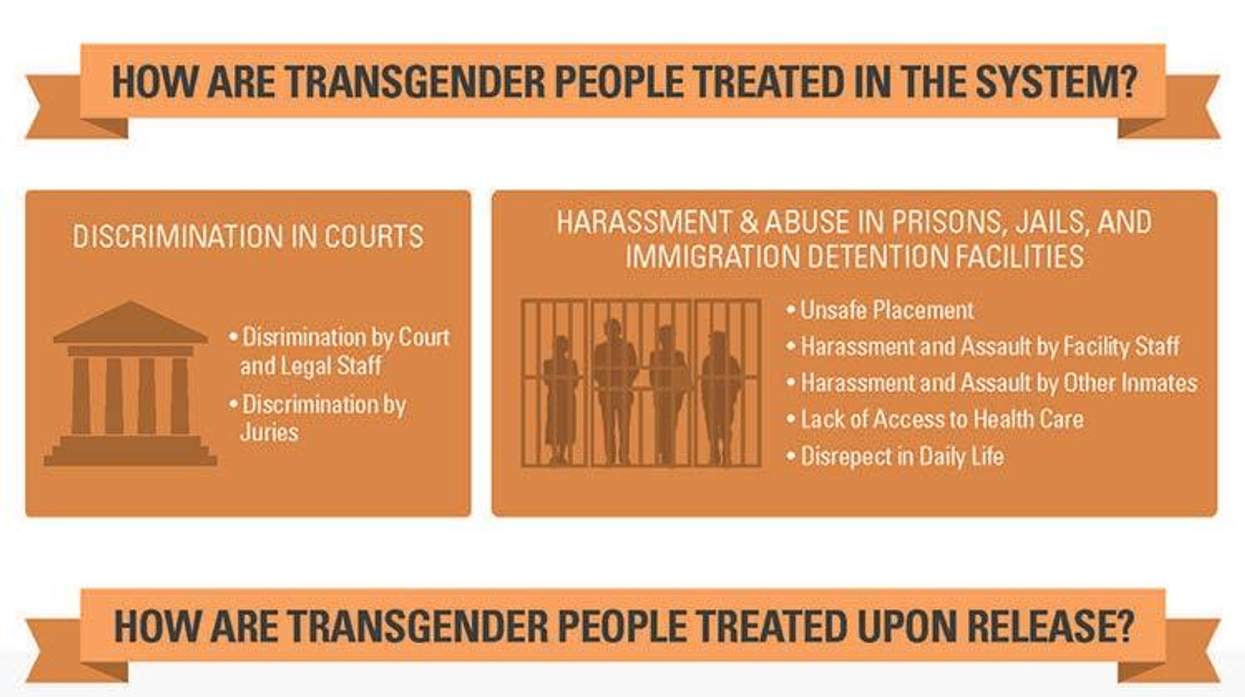A couple months ago, police arrested a very close and dear transgender friend of mine. Even though the charges against her were eventually dropped, it didn't happen until after she had been assaulted and abused by police due to her transgender identity -- leaving her scarred and traumatized.
Unfortunately, my friend is not alone amongst transgender people in her experience. The release of a new report from the Movement Advancement Project and the Center for American Progress, "Unjust: How the Broken Criminal Justice System Fails Transgender People," provides a vitally important insight into how to tackle a system that is clearly in need of radical justice reform due to its patterns of systemic oppression of the transgender community. The National LGBTQ Task Force is pleased to partner with MAP and CAP in preparing this report and urging for its recommendations to be implemented.
As the new report notes, over a fifth (22 percent) of the National Transgender Discrimination Survey respondents who had interacted with police experienced harassment. The 2015 LGBT Health and Human Services Needs Assessment conducted in New York State found that one in five transgender respondents (21 percent) had been unfairly arrested, harassed, or physically harmed with higher rates for transgender people of color (31 percent). Similarly, many transgender people face bias and discrimination once in court -- from judges or their own publicly appointed defense counsel -- and have their gender identity brought up against them in the courtroom. In fact, in Lambda Legal's survey titled "Protected and Served?" one quarter (26 percent) of transgender and gender-nonconforming respondents who had been in court in the past five years indicated their gender identity had been raised as an issue in court when it was not appropriate -- and 21 percent had been "outed" against their will in court.
Those transgender people who end up serving time in prison face high rates of abuse and discrimination: 77 percent of transgender women prisoners have been housed in male prisons, with nearly 85 percent having been placed in solitary confinement; 24 percent have been sexually assaulted by another inmate, compared to 2 percent of the general prison population (according to the National Inmate Survey); 47 percent in the NTDS -- respondents that mentioned they had been incarcerated -- reported being sexually harassed or assaulted.
The roots and consequences of this appalling picture are systemic. Extraordinarily high levels of employment and housing discrimination lead to unemployment and poverty, with transgender people being driven into homelessness (which one in five have experienced) and the underground economy (sex work, drugs, etc.), where they are then further criminalized.
This also places transgender undocumented immigrants at a greater risk of detention and deportation. If you cannot work, you are less likely to be able to find legal employment or qualify for housing and other benefits, and police often report undocumented people upon arrest and pass them over to Immigration and Customs Enforcement for custody for deportation proceedings. Criminal records also make an undocumented immigrant much more likely to qualify for "mandatory detention," meaning that they could spend months and years in immigration detention while their case is heard in immigration court.
Once you have a conviction record, then you are excluded from many public services, such as public housing and benefits -- and acquiring a job is infinitely more difficult. This traps transgender people in a vicious cycle. In the case of undocumented transgender people, a conviction can make them ineligible for legal status, or lose what legal status they had. It also raises the risk that they'll be deported after the conviction.
There is so much more work to be done.
This new report provides important prescriptions for progress -- creating a future where transgender people are not excluded from accessing the promise of America and where transgender people have freedom, justice, equality, and equity. A brighter and better future where my friend and thousands like her do not have to live in fear of being the latest victim of a broken criminal justice system.
 VICTORIA RODRIGUEZ-ROLDAN, J.D., serves as policy counsel for the National LGBTQ Task Force and directs the Trans/Gender Non-Conforming Justice Project at the Task Force. Originally from San Juan, Puerto Rico, Victoria has been a trans advocate since her late teens, consistently organizing her peers and breaking barriers as an out trans member of student government at the University of Puerto Rico, and presiding over the LGBT Caucus of the University of Maine School of Law for nearly three years. Starting in 2013, she led successful lobbying efforts for Puerto Rico to adopt trans-inclusive driver's licenses and state ID documents, culminating in a gubernatorial executive order. Victoria holds a B.A. in psychology with honors from UPR and a J.D. from the University of Maine School of Law.
VICTORIA RODRIGUEZ-ROLDAN, J.D., serves as policy counsel for the National LGBTQ Task Force and directs the Trans/Gender Non-Conforming Justice Project at the Task Force. Originally from San Juan, Puerto Rico, Victoria has been a trans advocate since her late teens, consistently organizing her peers and breaking barriers as an out trans member of student government at the University of Puerto Rico, and presiding over the LGBT Caucus of the University of Maine School of Law for nearly three years. Starting in 2013, she led successful lobbying efforts for Puerto Rico to adopt trans-inclusive driver's licenses and state ID documents, culminating in a gubernatorial executive order. Victoria holds a B.A. in psychology with honors from UPR and a J.D. from the University of Maine School of Law.


 VICTORIA RODRIGUEZ-ROLDAN, J.D., serves as policy counsel for the National LGBTQ Task Force and directs the Trans/Gender Non-Conforming Justice Project at the Task Force. Originally from San Juan, Puerto Rico, Victoria has been a trans advocate since her late teens, consistently organizing her peers and breaking barriers as an out trans member of student government at the University of Puerto Rico, and presiding over the LGBT Caucus of the University of Maine School of Law for nearly three years. Starting in 2013, she led successful lobbying efforts for Puerto Rico to adopt trans-inclusive driver's licenses and state ID documents, culminating in a gubernatorial executive order. Victoria holds a B.A. in psychology with honors from UPR and a J.D. from the University of Maine School of Law.
VICTORIA RODRIGUEZ-ROLDAN, J.D., serves as policy counsel for the National LGBTQ Task Force and directs the Trans/Gender Non-Conforming Justice Project at the Task Force. Originally from San Juan, Puerto Rico, Victoria has been a trans advocate since her late teens, consistently organizing her peers and breaking barriers as an out trans member of student government at the University of Puerto Rico, and presiding over the LGBT Caucus of the University of Maine School of Law for nearly three years. Starting in 2013, she led successful lobbying efforts for Puerto Rico to adopt trans-inclusive driver's licenses and state ID documents, culminating in a gubernatorial executive order. Victoria holds a B.A. in psychology with honors from UPR and a J.D. from the University of Maine School of Law.

































































Charlie Kirk DID say stoning gay people was the 'perfect law' — and these other heinous quotes